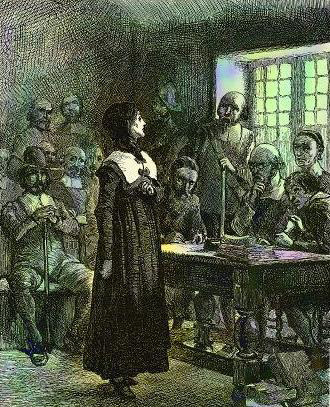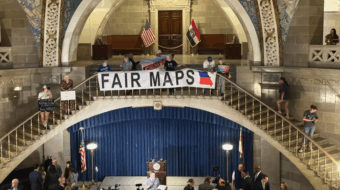
A big fuss is frequently made about the contributions of founding “fathers” to the freedoms we enjoy today, but far less is said about the role of women in formulating the basic beliefs we have today regarding individual freedom.
On March 22, 1682 Anne Hutchinson, perhaps the first widely followed spokesperson for religious freedom in what was to become the United States, was banned from the Massachusetts Bay Colony.
Hutchinson, the daughter of an English minister, was well versed in the Bible and was a follower of the popular preacher, John Cotton.
Her husband built a home located directly across the road from the famous three-time governor of the Massachusetts Bay Colony, John Winthrop.
Hutchinson, who was also a midwife and a nurse, attracted quite a crowd when she began to hold meetings in her home to discuss the sermons of John Cotton. As many as 60 people came to each of her meetings, often held twice a week to accommodate those who wanted to attend.
Needless to say, the idea of a woman running a regular theological discussion group didn’t go over too well among certain circles in the colony.
John Winthrop, the neighbor, described Hutchinson as “a woman of haughty and fierce carriage, of a nimble wit and active spirit, and a very voluble tongue, more bold than a man.”
Some of her real troubles began in 1636 when she accused Puritan ministers of making salvation dependent on an individual’s good works rather than on divine grace, which was contrary to Puritan teaching. The ministers denied this charge, arguing that good works are evidence of conversion and salvation, not the grounds of salvation. They argued that they were therefore not teaching a Covenant of Works rather than a Covenant of Grace, as she was claiming.
Hutchinson would not give up, insisting that assurance of salvation came from mystical experience of grace – “an inward conviction of the coming of the Spirit.” She said that by teaching that good works were evidence of true conversion and salvation, ministers were still preaching a Covenant of Works rather than a Covenant of Grace.
Hutchinson raised the bar even further by claiming that God had communicated to her by direct revelations and by claiming that she was capable of interpreting the Scriptures on her own.
All of this may seem to us today like quibbling over questions as critical as how many angels can fit on the head of a pin. But in the context of her place and times, Hutchinson’s charges amounted to a full frontal attack on the spiritual authority of both the church and the state. For Puritans, the ultimate source of authority was the Bible as duly authorized ministers interpreted it. Hutchinson saying she possessed the authority to interpret the Bible challenged this basic principle.
Even more of a dagger to the heart of state power in those days was her claim that she was getting immediate revelations directly from God. How dare she get such revelations? Her claims, the authorities realized, had the potential to tear apart the entire Massachusetts Bay Colony. If the state loses its monopoly over revelations from God there is no telling what else it might lose!
In November of 1637 then, Hutchinson was hauled before the General Court, the colony’s chief governing body, on charges of sedition. Winthrop questioned her relentlessly but she avoided all of his traps and the court adjourned with no ruling.
The following day she changed her position and freely acknowledged that God had spoken to her directly. The new move on her part met the ruling male definition of blasphemy and the court voted to banish her from the colony.
Anne and her husband settled in Roger Williams’ colony of Rhode Island, which was founded on principles of religious tolerance. In 1642 she moved with her family to New York where, in 1643 she and most of her family died in a Native American uprising. The Puritan ministers back in Massachusetts, upon hearing of her death, organized public celebrations. The minister Thomas Weld declared: “Thus the Lord heard our groans to heaven and freed us from this great and sore affliction.”
Image: “Anne Hutchinson on Trial” by Edwin Austin Abbey, made in 1901. Wikimedia Commons










